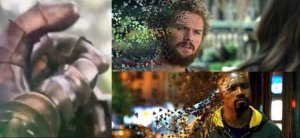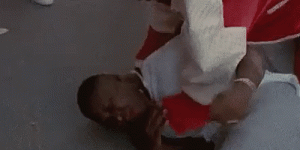Marvel TV Is Even Less Important To The MCU Now
5
ADVERTISING
There have been recent reports that
Marvel Studios is working on
an innovative new range of big-budget TV series, set to release on the Disney streaming platform when it's launched next year. But this raises difficult questions for the relationship between Marvel Studios and Marvel Television, essentially consigning the current slate of Marvel TV shows to a third tier in the MCU canon.
The Marvel Cinematic Universe is a unique franchise, a single shared universe that embraces 20 movies and a vast number of TV shows. They've always been bound by the catchphrase
"It's all connected" but in reality, the movies and TV series often seem fairly distanced from one another. That's partly because the relationship between Marvel Studios and Marvel Television has often been fraught. In 2015, behind-the-scenes drama between key figures at Marvel actually forced Disney to restructure Marvel Entertainment, pulling the film studio out as a separate Disney subsidiary. Ever since then, the connections between Marvel Studios and Marvel Television have been loose at best.
Read More: How Marvel Studios Works
But the latest news from Marvel Studios is a game-changer in the MCU. They're now preparing to make their own TV shows, and that's a hammer-blow to the likes of
Agents of S.H.I.E.L.D., Daredevil, and every other Marvel TV show.
MARVEL TV HAS ALWAYS STRUGGLED TO STAY IN MOVIE CANON
In theory, the Marvel TV shows are all set in the same universe as the movies. In practice, viewers have long complained that they really don't feel that well-connected anymore. Take the example of
Agents of S.H.I.E.L.D. When the series launched in 2013, tie-ins for the latest Marvel blockbuster seemed almost mandatory. Secondary MCU characters like Samuel L. Jackson's Nick Fury and Jaime Alexander's Sif even made cameos, and the narrative connection to
Captain America: The Winter Soldier was nearly seamless. But that pretty much came to a halt after the second season, and
S.H.I.E.L.D. gradually moved to thematic tie-ins rather than explicit narrative links. Although the show
name-dropped Thanos in season 5, it
ignored the cliffhanger ending of Avengers: Infinity War altogether.
ADVERTISING
The rest of Marvel's TV slate feels even more distanced from the movies. Take the Netflix shows; the first wave dropped in a number of references to "The Incident" (the Chitauri invasion in
The Avengers), but that was about it. The most recent connection was in
Jessica Jones season 2, which mentioned
a prison for superhumans that was introduced in
Captain America: Civil War. Looking beyond the Netflix shows,
Cloak & Dagger uses Roxxon, a company referenced in the movies, but otherwise links in only to the other TV series. And
Runaways might as well exist in a world of its own.
The films, meanwhile, simply ignore the TV shows altogether. "
People who make movies for Marvel, why don’t you acknowledge what happens on our show,"
Chloe Bennet complained back in 2016, "
Why don’t you guys go ask them that? Cause they don’t seem to care!" The reason for this distance is simple; Marvel Studios knows that their movies will be watched by far more people than follow any of the TV series. The majority of viewers wouldn't even understand a reference to shows like
Agents of S.H.I.E.L.D. or
Iron Fist, and at worst it would confuse and distract them.
ADVERTISING
Related: Marvel's New TV Series Can Solve Fundamental MCU Problems
Whether by accident or design, the
MCU has slipped into a sort of "tiered" approach to canon. The movies themselves are the top tier, absolute canon, expected to be reasonably consistent and superseding everything else. The tie-ins and TV shows exist on a lower tier, and are essentially only canon to the extent they don't contradict the films.
But the new shows are different. According to first reports, these series will be produced by Marvel Studios, with Kevin Feige himself overseeing their development. Some will introduce new characters, while others will see movie stars like
Tom Hiddleston and Elizabeth Olsen reprise their roles. What's more, they'll also command studio-level budgets.
The budget makes sense. Streaming services have always tended to put content above cost. Netflix, for example, spends a whopping $130 million per season for
The Crown, making it the most expensive TV series in history. Disney wants their new streaming service to compete directly with Netflix, meaning they need to aim for a similar quality of production. Given that's the case, it's no surprise that the Disney Play shows confirmed so far have staggering budgets;
Jon Favreau's upcoming Star Wars series is expected to cost $100 million.
But here's the catch; as far as the average viewer is concerned, these are all just Marvel TV shows. Audiences will naturally compare and contrast the Marvel Studios productions with the Marvel Television ones. They'll notice the very different quality in terms of production levels, and they'll pick up on the fact that some series feature movie actors, while others don't. Marvel Studios will produce a TV show in which Elizabeth Olsen uses her telekinesis to toss enemies around with ease; Marvel Television
couldn't afford a scene in which Finn Jones's Iron Fist confronted a CGI dragon.
Related: When Are Marvel's Other Netflix Shows Returning?
ADVERTISING
THIS MAKES MARVEL TELEVISION THIRD TIER INSTEAD OF SECOND
This dramatically reshapes the MCU's approach to canon. No longer do we have a two-tier system; now it will be a three-tier one, with current Marvel Television at the bottom.
The top tier will still be the movies, and they'll surely remain self-contained, with minimal impact on the movies. After all, Marvel's logic - that most viewers will only watch the films, and won't tune in to the TV series - will still hold true. Disney may be willing to pay for some tremendously expensive shows to launch on their new streaming service, but they're not going to risk damaging the films as well by adding another layer of complexity to their continuity.
ADVERTISING
The new Marvel Studios shows, then, will be second-tier in terms of their canonicity. They'll be tie-ins and spinoffs from the films in the truest sense of the word, exploring the characters and concepts that have been introduced through the movies, and adding new depth to the shared universe. They could tell Loki's backstory, or explore Wakanda with Shuri; they could reveal just what happened to Black Widow and Hawkeye in Budapest, or show Falcon on a mission against the Ten Rings. Marvel Studios may even choose to introduce new characters into the MCU through these shows; perhaps that's how we'll meet
Kamala Khan, or Richard Rider's Nova. But, per the initial report, they
won't feature the main Avengers.
And then there'll be Marvel Television, relegated to the fringes of the MCU, with lower production levels and starring characters who will never be seen on the big screen. Their new heroes will essentially be the dregs, passed up by Marvel Studios for both film and TV development. There's simply no getting around the facts; Marvel Television will be the third tier of the MCU's story, far removed from the Avengers and the Guardians of the Galaxy.
-
While Marvel fans were understandably thrilled when they first heard of these new Marvel Studios TV shows, anyone hoping the likes of Daredevil, Jessica Jones, Luke Cage, Iron Fist, or anyone on
Agents of S.H.I.E.L.D. would ever make their way onto the big screen can kiss those dreams goodbye. The only shows Marvel Studios is going to care about are the ones they're producing.


































